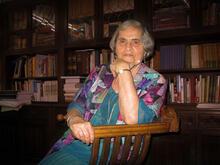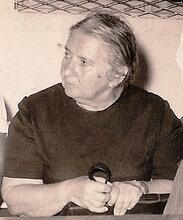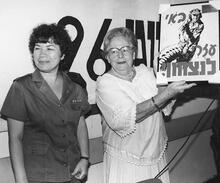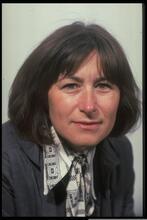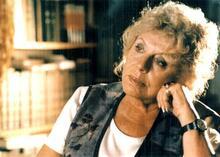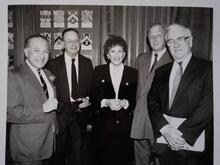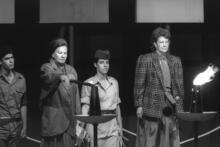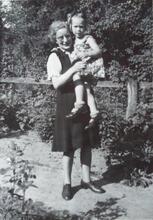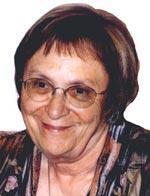Ruth Lapidoth
Ruth Lapidoth studied law at the Hebrew University of Jerusalem, where she became a professor in 1956. Lapidoth has taught and conducted research at numerous universities and institutions around the world. She has written nine books and over eighty articles dealing with questions of international law, in particular the law of the sea, human rights, and the Arab-Israeli conflict, especially with regard to the status of Jerusalem. According to Lapidoth, jurists have an important and sensitive role to play in resolving international disputes. Lapidoth has played an active role in the diplomatic sphere, following the course she set for herself at the beginning of her career. Her work had been highly awarded.
Family and Education
Professor Ruth Lapidoth is a major expert in international law. As a young woman, she decided to specialize in this field, seeing it as a path towards dialogue and a means to solve the Arab-Israel conflict. She hoped that international law could prevent wars and promote peace.
Lapidoth’s father, Dr. Oscar Asher Eschelbacher, was born and raised in Germany, where he studied dentistry. Her mother, Dr. Selma Sarah, née Roer, was also a dentist. In 1925 their older daughter Chana was born, followed by Ruth five years later, in 1930. The family left Germany and immigrated to Palestine in 1938. They settled in Ramat Gan.
In 1947 Lapidoth went to Paris to study music but the next year she returned to join the army of the newly founded state during Israel’s War of Independence, serving as a paramedic in the eighth brigade from 1948 to 1949. Her service had a profound effect on Lapidoth. One episode in particular is engraved in her memory: she was called upon to provide first aid to fighters wounded in the battle for the southern Negev and had her first exposure to the gravely wounded soldiers brought in from the battlefield. She felt that she had to do something to advance the cause of peace and prevent a recurrence of such terrible situations. It was as a result of this perception that she set her sights on international law since, in her view, it was the jurists who formulated the peace treaties and were in a position to contribute to promoting and implementing them. She wished to participate in the endeavor to create peace where none had existed before.
Lapidoth studied law at the Hebrew University of Jerusalem, graduating with distinction in 1954. She went on to complete her doctoral studies in 1956 at the Law School of the University of Paris, and also graduated at the Institut des Hautes Études Internationales – Université de Paris. Also in 1956, she married Aryeh Lapidoth, moving with him to Jerusalem in the same year. Aryeh Lapidoth, born in Jerusalem in 1930, specialized in taxation, becoming a full professor at Bar-Ilan University, where he remained until his retirement. The couple’s oldest son, Michael, was born in 1959 in Jerusalem, followed by Tamar in 1963 and Amos in 1965. Michael Lapidoth fell while serving in the IDF in 1982, aged only twenty-three.
Academic and Diplomatic Career
Ruth Lapidoth joined the faculty of the Hebrew University of Jerusalem in 1956, holding the rank of full professor from 1980 until her retirement in 2002. She then served as Greenblatt professor emerita at Hebrew University and a professor at the Law School of the College of Management.
In addition to her work at the Hebrew University of Jerusalem, Lapidoth taught and conducted research at numerous universities and institutions around the world: the University of Paris; the Woodrow Wilson Center in Washington, D.C.; New York University School of Law; the University of Geneva; the Bellagio Study and Conference Center; United States Institute of Peace; the Georgetown University Law Center; Ludwig-Maximilians University in Munich; and the University of Melbourne (Australia), among others.
She has written nine books and over eighty articles dealing with questions of international law, in particular the law of the sea, human rights, and the Arab-Israeli conflict, especially with regard to the status of Jerusalem. Lapidoth is a senior research fellow at the Jerusalem Institute for Israel Studies and a member of the Institute’s think tank on the future status of Jerusalem, which is examining possible alternatives for resolving the issue of Jerusalem’s boundaries, legal status, sovereignty, municipal administration, holy sites, security, religious and national symbols, and the significance of these symbols in various spheres. The think tank has formulated several alternatives that have been presented to Israeli governments over the years. Lapidoth is intensely involved in the question of Jerusalem; among her published works on the subject are a book dealing with the Basic Law: Jerusalem, Capital of Israel (the Israeli law that addresses the issue of Jerusalem) and a book dealing with the Old City.
In addition to her academic pursuits, Lapidoth has played an active role in the diplomatic sphere, following the course she set for herself at the beginning of her career. She was a member of the Israeli delegation to the United Nations in 1976, and a delegate to the International Humanitarian Law Conference (1977) and the International Red Cross Conference in 1981. Lapidoth also took part in the peace talks between Israel and Egypt in 1979 and served on the panel of professionals that worked on the historic peace agreement signed by the two countries.
From 1979 to 1981 Lapidoth served as the legal advisor to Israel’s Ministry of Foreign Affairs. In 1999 she was invited to join a panel of experts advising the High Commissioner on National Minorities of the Organization for Security and Cooperation in Europe. She was also a member from 1986 to 1988 of the ad hoc arbitration panel appointed to resolve boundary disputes between Egypt and Israel, including the Taba coastal area south of Eilat. Since 1989 she has been a member of the list of arbitrators of the Permanent Court of Arbitration at The Hague.
Ruth Lapidoth is the first Israeli woman to receive the prestigious Prominent Woman in International Law award from the WILIG group of the American Society of International Law (in 2000).
Honors and Legacy
According to Lapidoth, jurists have an important and sensitive role to play in resolving international disputes, since agreements between states must be formulated in legal terms. It is the legal apparatus and the jurists who must help to ensure that agreements are not only worded properly but also duly implemented.
In 2001 Lapidoth was awarded the Gass Prize for her research on Jerusalem, in 2004 the Israel Bar Association honored her for her outstanding research and in 2005 she was awarded the Israel Prize, the country’s most prestigious recognition of contribution to scholarship and the community.

